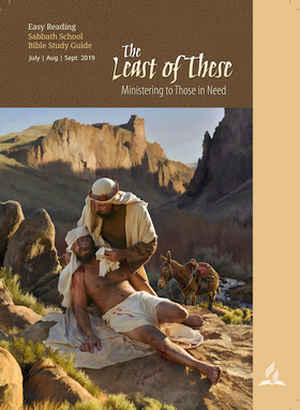The Least of These …
Ministering to Those in Need

Seventh-day Adventists are called to proclaim “the everlasting gospel” (Rev. 14:6) to all the world. By so doing, we are simply obeying Jesus’ words about making disciples, baptizing them, and “teaching them to observe all things that I have commanded you” (Matt. 28:20, NKJV). And among the things He commanded was that we minister to the hurting, the downtrodden, the poor, the hungry, the imprisoned.
After all, it was Jesus who, after telling the parable of the Good Samaritan (Luke 10:30-36), then commanded His listeners: “Go and do likewise” (Luke 10:37, NKJV). It was Jesus who, in depicting the time when He would divide the nations before Him as a “shepherd divides his sheep from the goats” (Matt. 25:32, NKJV), talked about just how important helping the hungry, the sick, the naked, and the imprisoned really is. “Assuredly, I say to you, inasmuch as you did it to one of the least of these My brethren, you did it to Me” (Matt. 25:40, NKJV).
In other words, along with proclaiming the great truths about salvation, the sanctuary, the state of the dead, and the perpetuity of the law, we are to minister to the needs of others. And what better way to reach people than by working in their behalf, too? As Ellen G. White famously wrote: “Christ’s method alone will give true success in reaching the people. The Saviour mingled with men as one who desired their good. He showed His sympathy for them, ministered to their needs, and won their confidence. Then He bade them, ‘Follow Me’”. – The Ministry of Healing, p. 143.
According to one count, Scripture contains 2,103 verses expressing God’s special concern for the poor and oppressed. Compared to many other aspects of faith, doctrine, and Christian living in general, the weight of references about ministering to those in need is overwhelming. We must get serious about working to relieve the pain and suffering that exists around us. This doesn’t take away from our work of spreading the gospel; on the contrary, it can become a powerful way of doing it.
Of course, it’s a good thing to help others, just for the sake of helping them. We should “do justly” (see Mic. 6:8) simply because it is both right and good to “do justice”. And yet, is it not even better when doing justice, when helping others in their immediate and temporal needs, also to point them to the “reason for the hope that is in you” (1 Pet. 3:15, NKJV), and that is the promise of eternal life in Christ?
Jesus healed disease, gave sight to the blind, cured lepers, even raised the dead. But all those to whom He ministered were going to die sooner or later anyway, right? So, in the long run, whatever good He did for them and their immediate needs, He also did more. Yes, He ministered to the hurting, but then He bade them, Follow Me. And that’s precisely why we, too, should minister to the hurting and then bid them, Follow Him.
No question, by seeking justice and goodness in the world, we are rehearsing the kingdom of God (see Luke 4:18, 19) in a way that is at least as faithful, valid, and perhaps effective as preaching it. When we care for the poor and the oppressed, we are actually offering honor and worship to God (see Isa. 58:6-10). But if we fail to minister in behalf of the hurting, the suffering, and the broken, we misrepresent Him (see Prov. 14:31).
This quarter, then, we’re going to see what the Word of God says (and it says a lot) about our duty to minister to the needs of those around us.
“Freely you have received, freely give” (Matt. 10:8, NKJV). That says it all.
Jonathan Duffy has served as president of ADRA International since 2012. Before joining ADRA Australia in 2008, Duffy served as director of Adventist Health for the church's South Pacific Division, where he had extensive experience in health promotion and community health development.
Video of the lesson presented by Pastor Doug Batchelor:
http://www.amazingfacts.org/media-library/media-archives/t/central-study-hour/sq/8/o/4/th/c.aspx
Video of the lesson presented by Dr Derek Norris:
http://hopess.hopetv.org/
The Teachers' Editions
https://www.absg.adventist.
Click on References below after the links to the lessons and before the cell phone signs for the verses of the week
Memory Text: “He who oppresses the poor reproaches his Maker, but he who honors Him has mercy on the needy” (Proverbs 14:31, NKJV).http://www.amazingfacts.org/media-library/media-archives/t/central-study-hour/sq/8/o/4/th/c.aspx
Video of the lesson presented by Dr Derek Norris:
http://hopess.hopetv.org/
The Teachers' Editions
https://www.absg.adventist.
Click on References below after the links to the lessons and before the cell phone signs for the verses of the week
This Quarter’s Study Contents
- God Created • Jun 29 – Jul 5


- Blueprint for a Better World • Jul 6 – 12


- Sabbath: A Day of Freedom• Jul 13 – 19


- Mery & Justice in Psalms & Prov • Jul 20 – 26


- The Cry of the Prophets • Jul 27 – Aug 2


- Worship the Creator • Aug 3 – 9


- Jesus and Those in Need • Aug 10 – 16


- “The Least of These” • Aug 17 – 23


- Ministry in teh NT Church • Aug 24 – 30


- Living the Gospel • Aug 31 – Sep 6


- Living the Advent Hope• Sep 7 – 13


- To Love Mercy • Sep 14 – 20


- A Community of Servants• Sep 21 – 27

